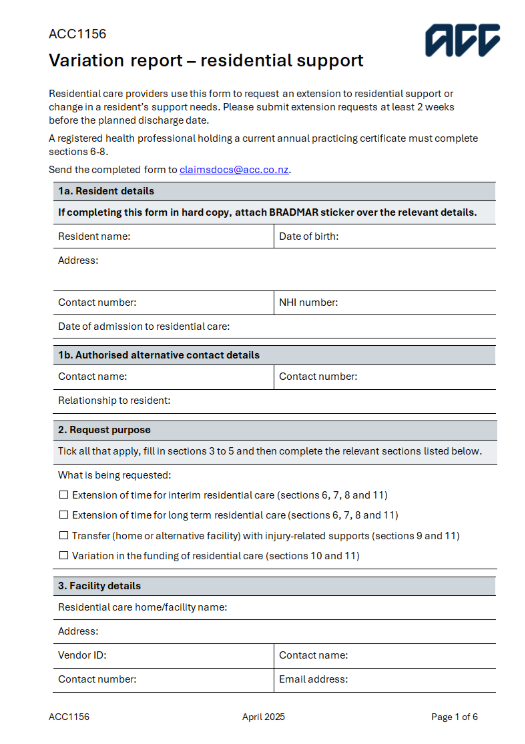Long term residential care
Long-term residential care is for clients who require more than six months of residential care or permanent residential care due to their covered injury.
Care is provided in an environment with structured daily routines and activities that are suitable for the client. Our aim is to provide an enriched life in a home-like environment where they maintain their independence to the maximum extent possible.
Referring clients to long term residential care
Clients can be referred from the community or a hospital to residential care. In some cases, they may already be in a care facility but not funded by us.
If a client is discharging from hospital to a residential facility, the hospital works with the client and their whānauto find a suitable care facility and ensure a safe transfer.
If a client is needing to move to a facility from their home, we will work with the client and their whānau to ensure they are supported to identify a suitable facility.
When choosing a suitable facility, we will consider:
- The level of support and rehabilitation required by the client
- The preferences of the client and their whānau
- The client's cultural, social, emotional, intellectual, and spiritual needs
- The ability of the client's whānau to visit and support the client
- Whether the facility is appropriate for the client's age
In cases where it is not possible to find a facility that meets all these requirements, some of these factors may be prioritised over others.
Funding long term residential care
We will work with clients to determine an appropriate level of funding for their support, considering their injury-related needs and other health factors, including the level of support they required prior to their injury.
In cases where the need for support arises from a combination of factors, the daily cost of residential care may be split between us and other funding sources, such as the Ministry of Health or contributions from the client.
When the responsibility for funding is unclear, we may arrange for an independent assessment to provide recommendations.
Support available
The amount of support a client receives in Residential Support Services varies and is assessed on a case-by-case basis. Support can include:
- Prompting or assistance with activities of daily living e.g., medication management, prompting to undertake tasks assistance, daily care routines, fatigue management
- A safe environment with quality medical and nursing care
- Maintenance of personal care skills through structured routines
- Behaviour management
- Frequent training and coaching interventions to assist the client to transition to independence (where appropriate)
- Clinical therapy inputs from therapy professionals for cognitive and physical care needs
- Frequent supervision by carers to ensure risks are managed and client safety is maintained
- Encouragement and support to maintain social integration and facilitation of social activities
Monitoring level of care
The Residential Support Services provider will complete an individual support plan/care plan using the 'ACC1155 Residential support form'.
Each care plan is tailored to the client's needs and documents the level of care for managing the client's condition, the support provided for safe independence, and ways to promote health and wellbeing, including spiritual, emotional, and cultural needs.
Care plans are regularly updated to reflect the client's changing needs (at least annually).
Over time, a client’s needs or required level of care may change, either increasing or decreasing.
In such cases, the residential facility must complete an 'ACC1156 Variation report - residential support' to notify us of these changes. This form is used to request a higher or lower level of funding or to request an extension in support.
Upon receipt of the form, the ACC recovery teams will review the request, confirm if the change or extension in the level of care can be approved, or request further information if needed.

ACC1156 variation report - residential support
This form is used to request funding for a higher or lower level of care or to request an extension in support.
Please note, a registered health professional needs to complete sections 6-8 of the form.
Each care plan is tailored to the client's needs and documents the level of care for managing the client's condition, the support provided for safe independence, and ways to promote health and wellbeing, including spiritual, emotional, and cultural needs.
Care plans are regularly updated to reflect the client's changing needs (at least annually).
Over time, a client’s needs or required level of care may change, either increasing or decreasing.
In such cases, the residential facility must complete an 'ACC1156 Variation report - residential support' to notify us of these changes. This form is used to request a higher or lower level of funding or to request an extension in support.
Upon receipt of the form, the ACC recovery teams will review the request, confirm if the change or extension in the level of care can be approved, or request further information if needed.